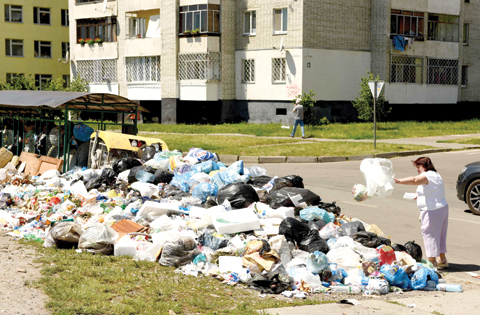Mayor blames crisis on garbage blockade
 UKRAINE: A woman throws rubbish to a pile of garbage in the western Ukrainian city of Lviv.—AFP
UKRAINE: A woman throws rubbish to a pile of garbage in the western Ukrainian city of Lviv.—AFPLVIV, Ukraine: Ukraine's western city of Lviv is famous for its picture-postcard graceful domes and cobblestone streets but it's not such a pretty sight in the back alleys, which are blighted by growing mountains of garbage. Waste has not been removed from some neighborhoods in the city of 700,000 people since May, with the stench scaring off tourists and a rat infestation threatening public health. The trash piles have built up due to an apparent political impasse between the Ukrainian government and the authorities in the city, arguably the most European-looking in the post-Soviet nation.
Kiev accuses Lviv's mayor of failing to handle waste management but the mayor blames the crisis on a "garbage blockade". Last month, locals took action into their own hands, blocking city streets to protest about the situation, with some even setting fire to the mounds of waste. Lviv resident Mariya Sydorovych, 58, said that despite summer heat of more than 30 degrees Celsius she does not dare open the windows. "It's just an indescribable stink. Some rubbish piles have reached the level of the second floor," she said.
"We have garbage cans near the playground. Children have not been playing there for weeks, because they cannot stand it." Doctors share residents' concerns about the possible deterioration of the health of the city's inhabitants. "If we do not ensure removal of garbage from Lviv in time, we could face dangerous consequences for the health of Lviv residents," Volodymyr Zub, the city council's health department chief, said.
"Such a situation can lead to frequent and prolonged outbreaks of intestinal infections. Under such conditions, the number of rodents that are carriers of dangerous diseases may increase." While many locals accuse city authorities of causing the crisis, Lviv mayor Andriy Sadovyi said that it was impossible to move the rubbish out of the city because of a "garbage blockade".
Mismanagement or politics?
He said the problem started in May 2016 when the main landfill for Lviv's waste caught fire and four firefighters died, prompting state authorities to shut down the site. "But since then we have a problem of where to move our 600 tons of garbage daily," 48-year-old bespectacled Sadovyi lamented. "With 5,500 landfills in Ukraine, I thought that we would be able to solve the problem but all these landfills began to close to my city one after another."
The embattled mayor went further, accusing the government of pressuring landfill owners across the country not to accept refuse from Lviv in order to discredit him not just as mayor, but also as leader of the Samopomich political party. Sadovyi was once an ally of Ukrainian President Petro Poroshenko but Samopomich (Self-Reliance) left the president's ruling coalition bloc last year, joining the opposition. "The reason (for the blockade) is that we prevent the authorities from realizing
undemocratic plans," Sadovyi said.
"This is a political issue more than economic," Vadym Karasyov, the head of Kiev-based Institute of Global Strategies, said. "If Sadovyi did not pretend to be a politician of national scale the problem would be resolved much faster." With Sadovyi and central authorities locked in a war of words, the Kiev government has rejected claims of a blockade, saying Lviv city hall is at the root of the waste dilemma.
The conflict reached a new level last month as three lawmakers from Sadovyi's party went on a six-day hunger strike to put more pressure on Kiev to solve the problem. That pushed Prime Minister Volodymyr Groysman to urge the country's municipal authorities to help the western city by accepting the city's garbage at their landfill sites. Groysman said the government was willing to allocate 50 million hryvnias ($1.9 million, 1.7 million euros) for construction of a new landfill in the Lviv region.--AFP









